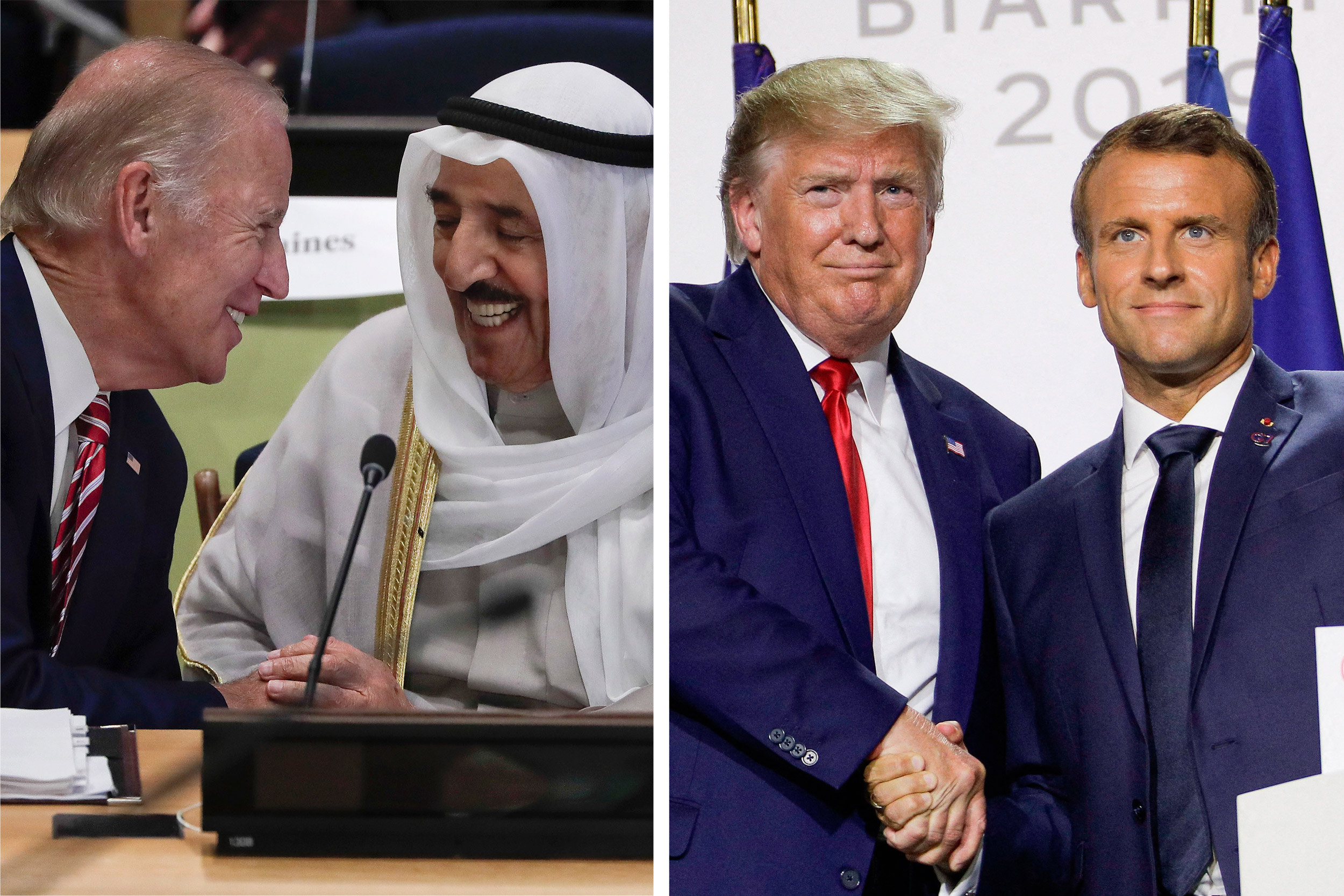
In September 2016, Vice President Joe Biden with Kuwait’s emir Sheik Sabah Al Ahmed Al Sabah at the Leader’s Refugee Summit during the 71st session of the UN General Assembly. President Trump with French President Emmanuel Macron at a press conference during the G7 summit France in 2019.
File photos: AP/Julie Jacobson (left); Thibaud Moritz/Abaca/Sipa USA (Sipa via AP Images)
How might the election change the nation’s place on world stage?
Scholars, analysts examine possibilities in foreign policy, intelligence, and defense
Presidential candidates President Donald Trump and former Vice President Joe Biden faced few questions on foreign policy during this year’s debates. Not surprising given that Americans remain consumed by the domestic catastrophe brought on by the coronavirus pandemic, a reeling economy, reckoning over race and inequity, and climate-related disasters like wildfires in the West. But the two men’s very divergent views will undoubtedly guide the trajectory of U.S. authority and standing in the world over the next four years. Harvard scholars and analysts on U.S. intelligence, Russia, China, Europe, the Middle East, and nuclear threats posed by North Korea and Iran look at where we are now and consider how the election results could alter current U.S. priorities, relationships, and power dynamics.
U.S. intelligence
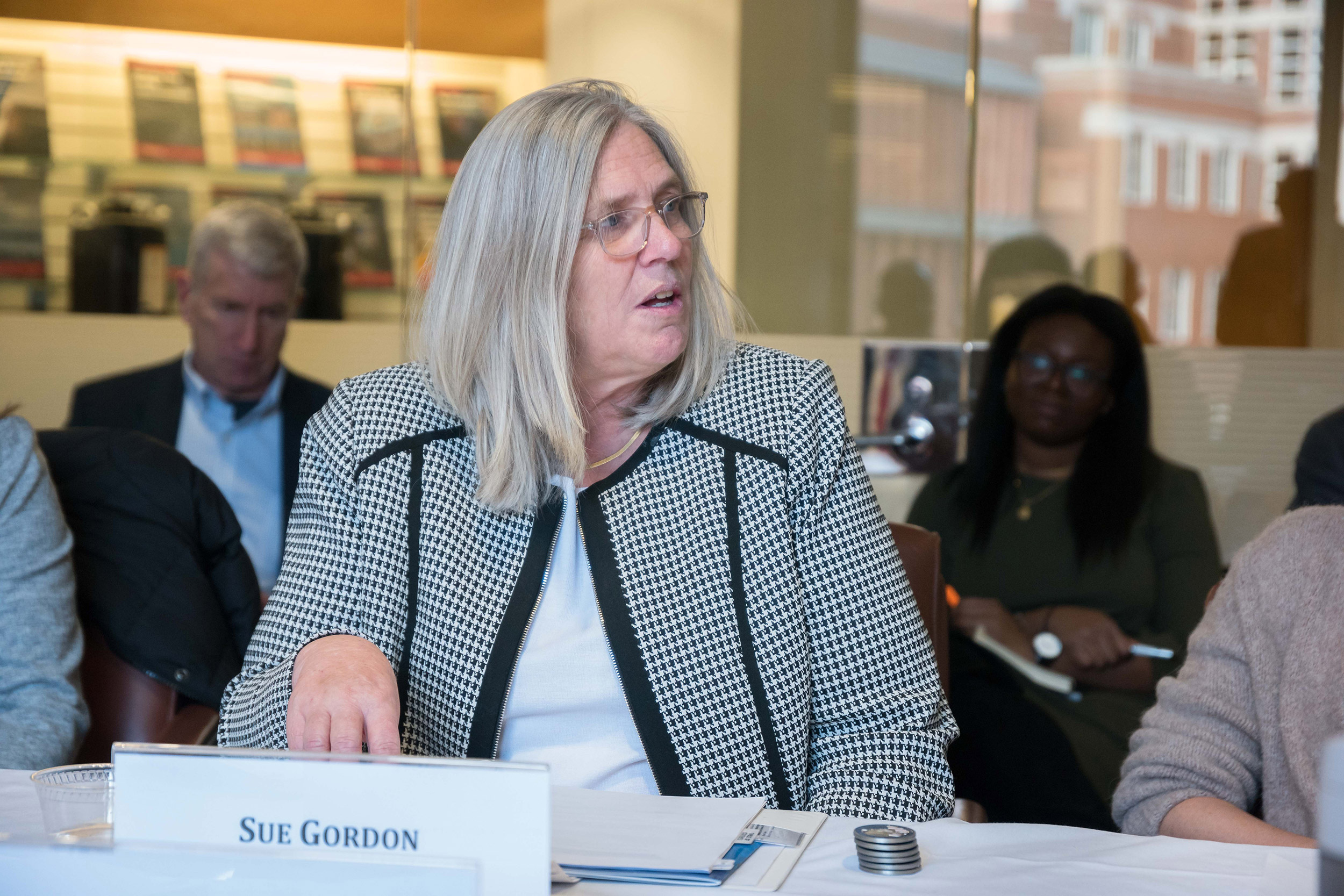
Benn Craig/Belfer Center
Sue Gordon
Senior Fellow, Belfer Center for Science and International Affairs, Harvard Kennedy School
Principal Deputy Director of National Intelligence, 2017‒2019
What are the challenges facing U.S. intelligence going forward and particularly if there is a change at the White House?
Regardless of who is elected, the Intelligence Community (IC) has work to do just to meet the demands of the national and global security situation. There are four areas demanding attention: intelligence priorities and appropriate resourcing, technical education and innovation, new-age partnerships, and embracing transparency and openness (and countering the same).
With a Biden victory, the president-elect has the chance to install leadership capable of meeting these challenges and rebuilding trust between the White House and IC. That leadership has to be driven more by competence than by party loyalty because of the real work they will need to do for the community, not just for the president. A Biden White House must reassert the importance of the independence of intelligence agencies, even as they are included in the national security and national economic processes; support a budget that funds research, development, and implementation of trusted AI; press for intelligence products that support modern decision-making; and drive reinvigorated intelligence relationships with foreign partners.
What risks could the U.S. face if there’s a disputed election or if Trump loses but does not accept that result?
If a disputed election, I see three potential threats: opportunistic actors who would take advantage of our distraction and uncertainty to advance their aims; intensive cyber influence operations to sow division and exacerbate mistrust within the government and among the American people; and unforeseen events that demand unified response.
The problem I see is that in times of transition — whether peaceful or tumultuous — two things upon which we usually rely for stability are uncertain. The first are our institutions. They are the foundation of fair, repeatable, systemic action. And for the past four years they have been under attack — not for their performance (which must improve) but for their integrity. The narrative that Americans can’t trust their institutions will cost us if the election is contested. The second is our leaders. Our system was designed to put authority in the position, not the person — the role of the person is to make sure that the populace is well-served by their sure execution of their authorities, regardless of their personal interests.
Russia

Photo by Sarah Failla
Alexandra Vacroux, Ph.D. ’05
Executive Director, Davis Center for Russian and Eurasian Studies
Lecturer on Government at Harvard University
How might the results of the voting affect U.S. relations with Russia, particularly since they sought to help Trump win in 2016?
It’s not clear that the Russians are still all-in for Trump. The Kremlin supported Trump in 2016 because they feared Clinton would be more difficult to work with. But Trump hasn’t produced an improved bilateral relationship, and he is perceived as weak and ineffectual. Of course, that might mean he is easier to manipulate. If there’s a decent chance that Trump will lose the election — and you can bet that Russia is following Nate Silver’s 538 models as closely as we are — Putin won’t see an advantage to granting Trump favors. Trump is still hoping for a preelection announcement extending the new START treaty, but the Russians haven’t been keen on backing the wrong horse at this late stage in the election cycle.
A new administration would reassess all foreign policy, including U.S.-Russia relations. But a Biden win is unlikely to result in a significant change vis-à-vis Russia. There’s little reason to improve ties, and the relationship is so bad that it’s unlikely to get worse. Many of the U.S. sanctions against Russia are congressionally imposed, and few Democrats or Republicans will want to be on the record supporting closer ties with Russia.
If Trump remains in power, what is Putin likely to try to get from the U.S.?
The question is: What does Putin want? He wants Russia to be treated as one of the great powers in the world, alongside the U.S. and China. He is unlikely to get that from any American president. He wants his economy to grow, but U.S.-Russian trade ties have never been particularly impressive. Putin may be counting on Trump to help him achieve other goals, e.g., reducing U.S. troops in Germany and undermining NATO, but the Russians see these decisions as evidence of Trump’s petulant incompetence rather than as rapprochement. Trump is good for Putin because he has increased political fragmentation in the U.S. The more attention American political leaders have to devote to chaos at home, the more freedom of maneuver Russia has to increase its influence in other parts of the world.
China

Courtesy of Ash Center
Edward A. Cunningham, A.M. ’00
Director of the Ash Center China Programs and the Asia Energy and Sustainability Initiative, Harvard Kennedy School
What does the future look like in terms of our relations with China, particularly around trade and the economy?
I suspect the consensus is partially right — direct trade and market access pressure on China will largely continue. However, indirect and more coordinated investment-related and military pressure may increase. A few important but narrowly defined areas of cooperation will be pursued with vigor. Taken together, this combination of status quo and change will result in a Biden administration that may find itself pursuing policies that contrast sharply with one another: U.S. military actions in the Asian region may prove more unilateral, while economic actions may prove to be an interesting mix of renewed but limited multilateralism and continued protectionism. Importantly, these China policies may be promulgated earlier in the administration than many think.
While a President Biden will undoubtedly focus initially on domestic concerns, I doubt that he would be able to delay addressing changes to the U.S.-China relationship. A new U.S. administration would begin 2021 prioritizing a COVID-19 response. Yet next year, China will celebrate the Chinese Communist Party’s 100th anniversary and continue to expand its influence militarily and economically; Japan-Republic of Korea relations may continue to deteriorate; leaders on Taiwan will watch the struggles of Hong Kong with growing unease; climate change and environmental crises will continue; South China Sea tensions will remain; and a range of trade tariffs will continue to undermine U.S.-China economic engagement.
Moreover, many of the inputs critical to a more resilient U.S. personal protective equipment (PPE) supply chain, clean energy infrastructure technologies, climate and conservation agreements, and other Biden priorities depend on supply chains and voting influenced by China and therefore require a concerted effort to get right. As a result, Biden would likely maintain the majority of existing economic tariffs on Chinese goods. However, he will probably lift a narrow range of targeted tariffs on certain intermediate- and lower-value-added products with limited alternative sources. The economic narrative will in part continue to focus on China meeting [World Trade Organization] obligations and related access to China’s growing services market.
In contrast to the Trump administration, Biden would be in a better position to work more closely with European and Asian allies to further tighten government screening of Chinese investment by state-owned enterprises in sensitive high-tech and dual-use sectors. Related efforts to share surveillance and data may be muted by allies. Also in contrast, Biden will likely pursue a more vigorous U.S. industrial policy that may channel a range of subsidies and Buy American Act controls to support the further development of American semiconductor, ICT [information and communications technology], medical equipment, steel, and infrastructure-related industries. However, such efforts may complicate moves to increase trade with allies in such key sectors and run counter to the U.S. drumbeat of pushing open-market access. Depending on how lessons of the Obama era have been internalized by the Biden team, Chinese actions in the region that are deemed aggressive may be met with more decisive and unilateral displays of American military support of allies.
A Biden presidency would also reach out to China in important areas through multilateral means and undoubtedly include a recommitment to the Paris Agreement and strengthened partnership with China on carbon-emission-reduction goals, as well as joint pandemic management through the World Health Organization. Here again, though, such areas of real potential progress will be in tension with other priorities, including a probable return to pressuring China on its human rights abuses related to Uighurs in Xinjiang and a range of other important cases. Much will depend on how policymakers on both sides of the Pacific measure the tradeoffs of these internal tensions in policy and how committed they are to scoring incremental wins and maintaining joint work goals in important policy areas, while also engaging in medium- to long-term realignment of supply chains, investment patterns, diplomatic resources, and force postures.
European Union
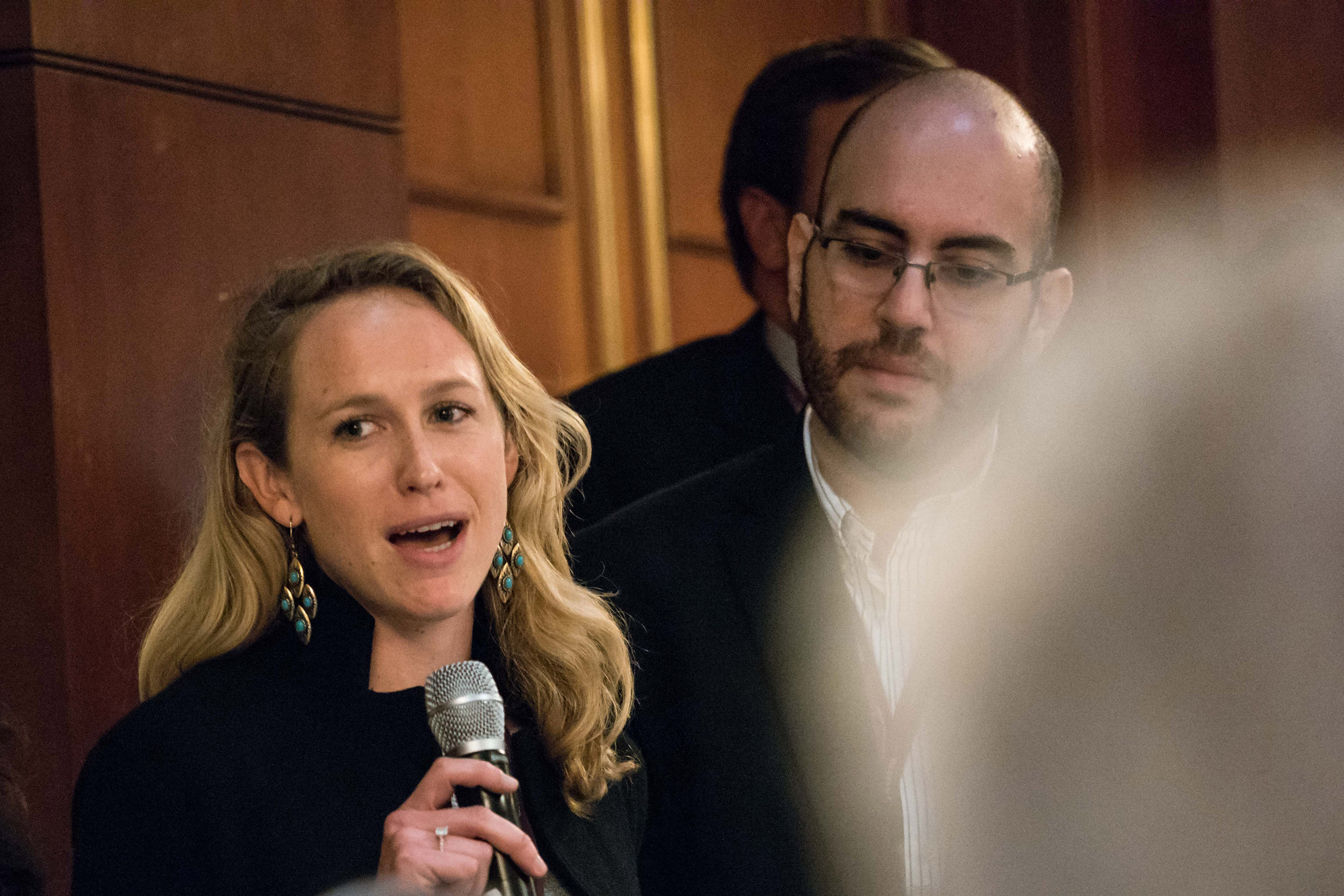
Benn Craig/Belfer Center
Torrey Taussig
Research Director, Project on Europe and the Trans-Atlantic Relationship
Belfer Center on Science and International Affairs, Harvard Kennedy School
Given his foreign policy chops, how do you expect Biden might broach mending the frayed relationship with allies in Europe and the UK?
A Biden administration would present the U.S. and its European partners with an opportunity to rebuild trust and cohesion in the trans-Atlantic relationship. A critical reset is needed after four years of a Trump administration that has called the European Union a “foe,” raised doubts over America’s commitment to NATO, and has withdrawn from key international treaties such as the Paris climate accord and the Iran nuclear deal. A Biden administration would work with European partners on a range of shared challenges, including China, Russia, Iran, climate change, democratic backsliding in the alliance, trade and technology, and reform institutions to achieve U.S. interests and maintain global stability.
Biden’s long career in the U.S. Senate and on the Senate Committee on Foreign Relations point to a strong track record of support for Euro-Atlantic institutions and alliances from the Balkans to the Baltics. In the early 1990s, Biden was a strong advocate for responding to Serbian aggression in Bosnia and Herzegovina and for intensifying pressure to bring about an end to the war. Throughout the 1990s and early 2000s, he was a key proponent of NATO membership for Poland, Hungary, the Czech Republic, and the Baltic states. Following Russia’s annexation of Crimea and occupation of the Donbas in 2014, Biden argued for enhanced U.S. military presence in Central and Eastern Europe to deter further Russian aggression and was a major force behind the European Reassurance Initiative. These actions, among many others, highlight for Europeans that they would have a willing and capable partner in the White House.
That said, greater cooperation between the U.S. and Europe under a Biden administration is not preordained. It will take a significant amount of work to restore trust and make progress toward shared goals. Initial efforts to strengthen ties could include an early visit from a new administration to Europe and a potential series of summits with EU and NATO leaders. Much will also be required from the European Union and EU member states that have thus far failed to unite on a shared China policy, shoulder more of the burden of defense spending in NATO, and adequately address democracy challenges among EU member states. COVID-19 and the ongoing task of economic recovery will present the U.S. and Europe with an even more difficult reality in 2021.
Middle East
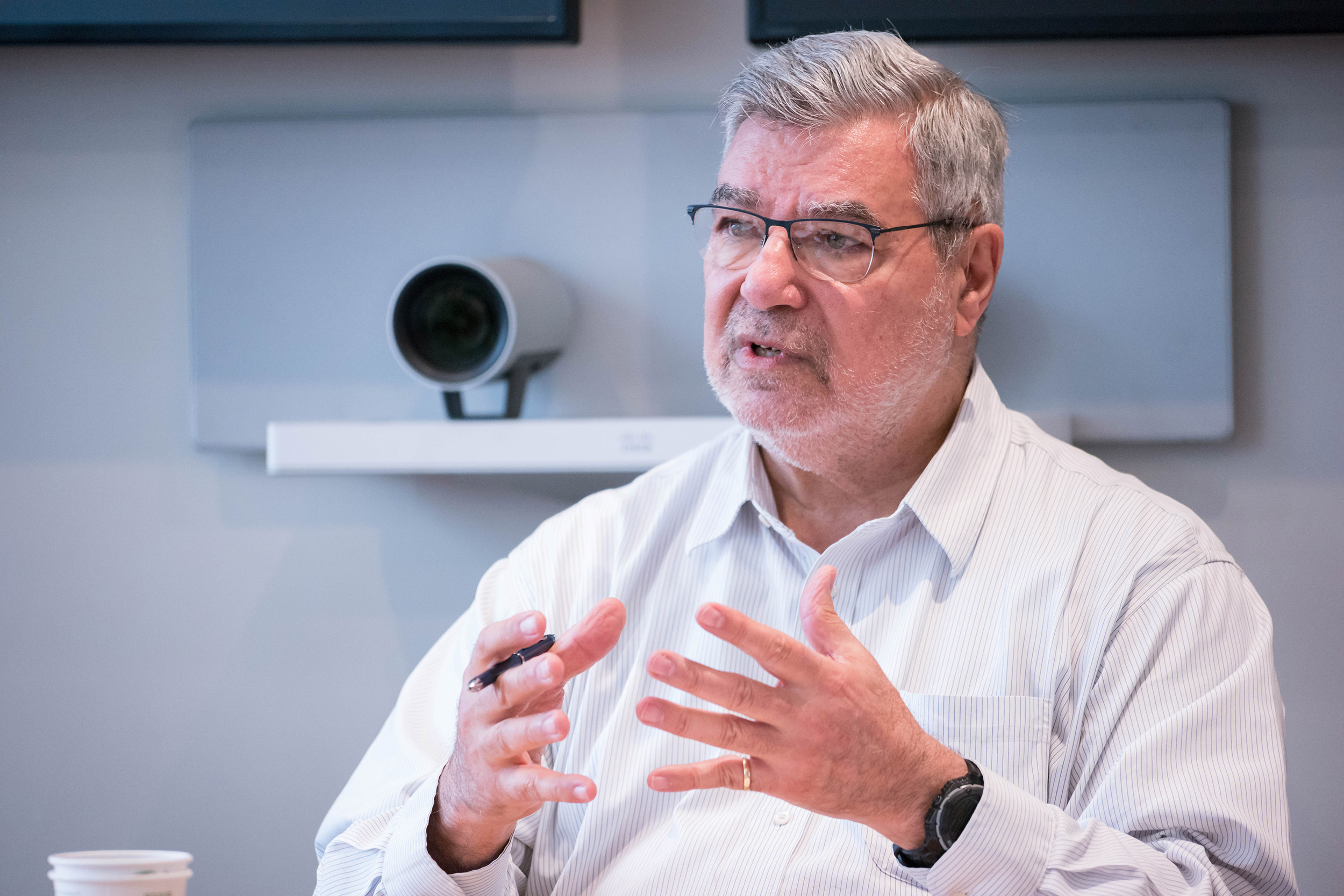
Benn Craig/Belfer Center
Rami Khouri
Senior Fellow, Middle East Initiative, Harvard Kennedy School
Journalist and internationally syndicated columnist for Agence Global, USA
How might the election results affect U.S. relationships in the Middle East?
The only major difference in the Middle East between a Trump or Biden presidency would be in Iran relations, where Biden would try to return to the negotiated nuclear sanctions agreement from which Trump pulled the U.S. out. On Israel-Palestine, there would be only minor differences, in tone rather than in substance, as both Biden and Trump essentially favor Israel and give it virtually everything it seeks — arms, money, and no serious opposition to its colonial settlements.
We are likely also to see some minor differences in relations with Saudi Arabia, with Biden putting some very mild and mostly symbolic pressures on the Saudis for their policies in Yemen and on internal human rights. The U.S.A.’s foreign policy in the Middle East has changed very little between Republican- or Democratic-led governments, and we will see this again if Biden wins.
The truth is that Middle East policy matters very little to the U.S. these days, as no major security threats to the U.S. emanate from the region, and the U.S. and other Western states feel they can control concerns about the issues that matter to them, namely oil and gas flows, terrorism, refugees, and mass migration. Regional powers like Iran, Israel, and Turkey, or would-be powers like Saudi Arabia, the UAE, and Qatar, are more decisive in impacting the region, along with Russia, among the global powers. The U.S. has entangled itself haplessly in wasted military efforts in Afghanistan, Iraq, Libya, and Syria, and will want to wind down its direct military involvement in the region, regardless of who is president.
Nuclear threats
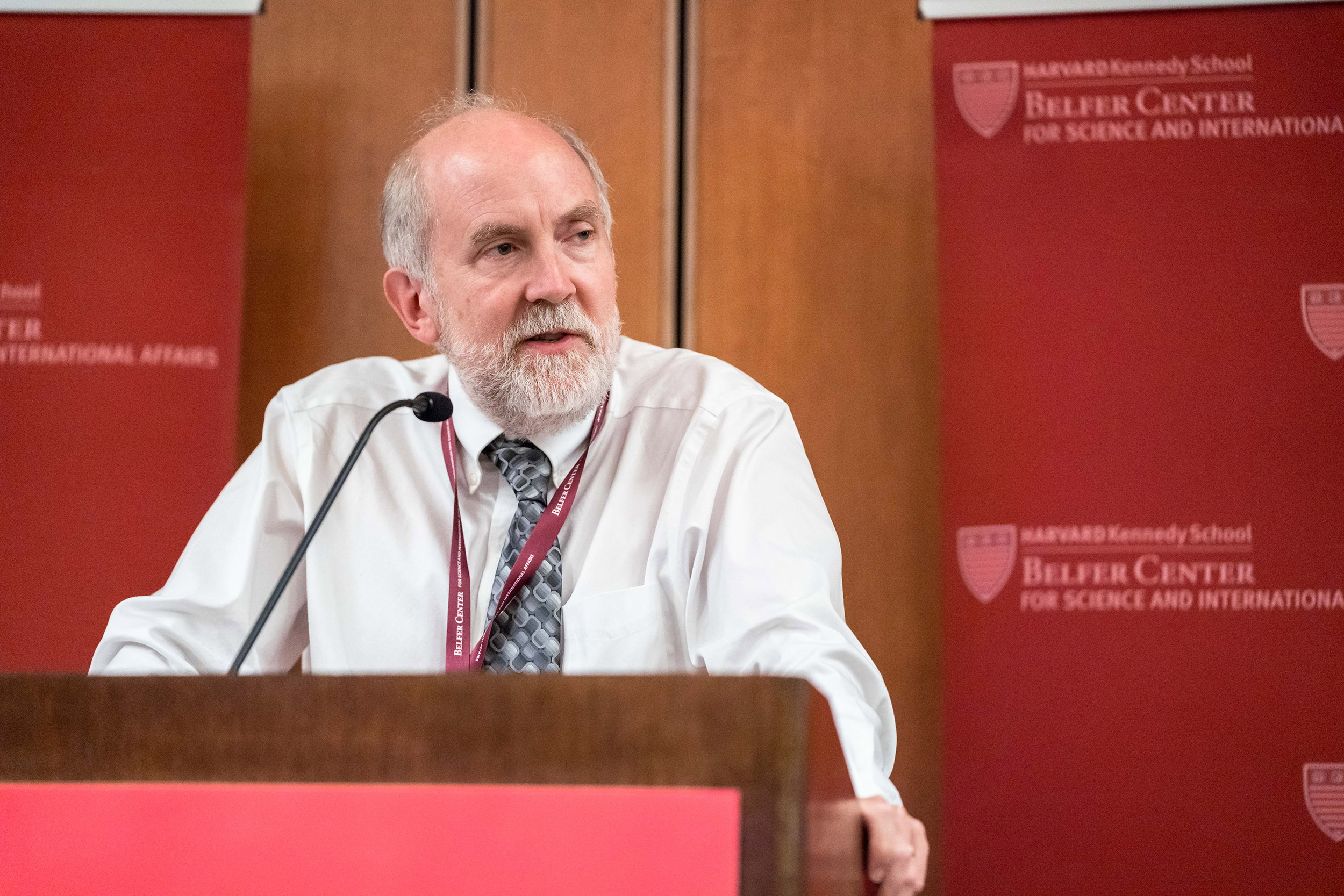
Benn Craig/Belfer Center
Matthew Bunn
James R. Schlesinger Professor of the Practice of Energy, National Security, and Foreign Policy
Faculty Director, Project on Managing the Atom, Harvard Kennedy School
How might a Biden administration be different from Trump’s in the nation’s strategy for attempting to shape the nuclear arms programs of Iran, North Korea, and Russia?
The danger of nuclear war has been rising, as hostility between the major powers rises and new technologies from cyber to counter-space weapons make stability more difficult to sustain. For much of his Senate career, particularly as chairman of the Senate Foreign Relations Committee, former Vice President Biden immersed himself in nuclear issues, and he would be well-positioned to take action to reduce nuclear risks. His approach, if elected, would be quite different from President Trump’s — less ripping up of past accords and more hard-headed bargaining for new ones that would serve U.S. national security interests. Biden has made clear that he would extend the new START treaty that limits U.S. and Russian strategic nuclear forces to provide nuclear predictability and verification while a follow-on pact with further reductions was negotiated. He has made clear that he would return to the Iran nuclear deal, while seeking to strengthen some of its provisions. He has taken a fairly tough line on North Korea’s nuclear program, but recognizes the danger of confrontation on the Korean peninsula. Hence, he would likely seek to use a combination of strengthened sanctions on North Korea and cooperation with China to get North Korea to agree to first-stage steps that would reduce the nuclear danger, while still holding out the ultimate hope for a denuclearized Korean peninsula. He would likely continue past efforts to ensure that nuclear weapons and materials around the world are secure and kept out of terrorist hands.
Comments have been lightly edited for clarity and length.




